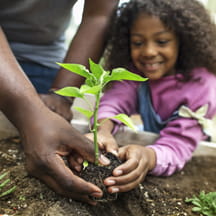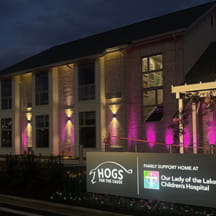The kids erupted in cheers of solidarity as the little girl in the book proclaimed, “I will never — not ever — eat a tomato!”
Spoiler alert: Pretty soon, they were all eating tomatoes — red and yellow and orange ones too.
Surrounded by garden beds where 20 tomato varieties and other freshly harvested ingredients grew, a chef guided the children and their families on how to make their own special salad and smoothie.
Then, around 50 community members shared a healthy meal together as part of the free monthly Books and Cooks program at the Garden at Karabots. They left with the featured children’s book, recipes, fresh produce, and full bellies.
It’s just one of dozens of community events hosted at the garden outside Children’s Hospital of Philadelphia’s (CHOP) Karabots Pediatric Care Center in West Philly.
The garden, open to the public, started with a couple raised flower beds in 2014.
Today, it yields around 4,000 pounds of fruits and vegetables annually that are given to patient families and Early Head Start families in the area.
Digging up magic
But it’s become so much more than a production space for nutritious food.
The garden is a gathering place.
It’s where children run and read when they’re waiting for an appointment, where staff reset and celebrate, where neighbors volunteer and attend movie nights, where refugee families meet and share a meal.
And, according to Carly Freedman, it’s magic.
A little boy who adamantly refused to eat veggies at home yanked a beet from the soil and took one big juicy bite and another and another until he was dripping in purple.
Kids triumphantly turned fresh-picked berries into smoothies by peddling as fast as they could on a stationary bike that powered a blender at the annual Harvest Festival.
Siblings waiting for an appointment were helping Freedman turn the soil when they spotted their first worm, were immediately enamored, and begged to come back to help again.
“When the whole garden is your play area, it creates these magical moments that to me are the real beauty of having a space like this,” Freedman said. “I just love the look of wonder for kids when they’re doing something new, so we try to create as many of those experiences as we can.”
Tending soil, cultivating community
Always trying to grow the garden’s reach, Freedman hands out her dirt-smudged business cards all over the city.
The cards say Community Garden and Food Sustainability Program Coordinator.
But everyone calls Freedman “the farmer.”
She calls the job “one of the greatest joys of my life.”

As the garden’s only employee throughout its 11 years, Freedman has tended to every inch of soil, planned expansions including an orchard with 14 kinds of trees and 250 feet of berry bushes, and developed interactive educational events from music classes to how to manage pests in plants, kimchi fermentation, and canning workshops.
A recent one on making goumi berry jelly was also an opportunity to introduce people to a fruit they may have never heard of, let alone tasted.
Events are designed to develop an appreciation for healthy life choices, give kids hands-on experiences with nature, and promote community connections, all of which impact physical and mental health.
“We’re able to offer this beautiful space to the community in really creative ways,” Freedman said. “I think the opportunities are endless for our little oasis in the city.”
Planting curiosity and connection
Every summer, families participating in CHOP’s Refugee Health Program are invited to a garden party. For some, it’s their first time meeting others who speak their native language since arriving in the United States.
“To be able to watch people making connections and exchanging numbers and building community — in a new community in a new country — is really meaningful,” Freedman said. “That’s really what the garden was created for: to connect people and touch their lives in multiple ways.”
She asks if there’s a food they are missing from home, then grows it for them and for others to have the chance to taste. That’s how Trinidad seasoning peppers became one of the 500 varieties of plants grown there. A family from the island who has been going to garden events for years couldn’t find the peppers locally.
“We have staff from there too, and they were all so excited to have this taste of home,” Freedman said. “It’s important to grow culturally appropriate foods for the communities we serve.”
She also likes to grow uncommon foods like hardy kiwi berries, pawpaw, and the toothache plant to capture the attention of kids and adults.
Karabots clinicians often suggest patients with food aversions spend time in the garden so they can sample fruits and veggies in a different environment.
“There’s something magical about being able to see how something grows that sparks bravery in children to try new things,” Freedman said. “When you’re able to touch it and harvest it, it’s amazing how that takes away the fear and makes food seem more approachable.”
Branching out
The community garden is entirely funded by grants and donations big and small.
Grandparents on a neighborhood stroll with their grandkids happened upon the space and were so impressed they gave enough money to cover a year of Books and Cooks events.
Children’s books about food, nature, and community are also now available there every day with the addition of a free library and shade structure installed this spring as the centerpiece of the labyrinth of planted beds, thanks to a grant from the Rite-Aid Foundation. Garden visitors can read new books there or take them home.
The Garden at Karabots is one of 25 community-facing programs designed to improve the health of kids in the area by addressing the social drivers of health and building partnerships where they live, learn, play, and heal.
Others include free legal representation for families facing eviction, grief and loss support groups for children and caregivers, and schoolyard greening and safety enhancements. All are part of the Healthier Together initiative led by CHOP’s Office of Community Impact.
“The philosophy is to meet families where they are and provide social services that touch the entire family because we know child wellness is tied to the health of the family and ultimately benefits the community,” Freedman said.
To further expand the mission behind the Garden at Karabots, CHOP’s Healthier Together initiative has also provided $500,000 to their community partner Southwest and West Agriculture Group, a collaborative of farm-based programs in Southwest and West Philly that is creating alternative food systems and educational programming around those systems and food sovereignty and sustainability.
“We are very intentionally trying to make sure we are able to reach and impact as many families as we can,” Freedman said.



